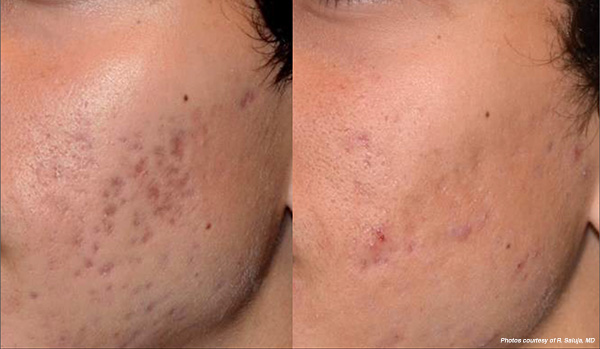
Suffering from acne can be a real struggle. Even though you should know acne is common and you are not alone, dealing with acne and worse – the scars it leaves behind – can be really frustrating.
Understanding what is going on with your skin can help you to avoid and minimize scarring. And the great news is, even if you have acne scars, we have solutions. Check out our guide to acne scar prevention and management below, and get in touch to learn about these effective treatments for scarring.
Causes of Acne Scars
Scars are actually evidence of your body’s efforts at healing itself from injury. With acne, your body heals the skin at an acne lesion by producing collagen fibers. Unfortunately, when the healing process does not occur perfectly, a scar can form. When too much collagen is produced, a raised scar can appear. When too little is produced, a pitted scar can form.
Whiteheads and blackheads typically don’t cause scarring. Inflammatory acne is more likely to cause scarring because it impacts deeper layers of the skin.
How to Avoid Acne Scars
Certain factors that impact acne scarring include:
- Genetics – Some people are genetically predisposed to more scarring. If this is the case, you cannot impact this factor directly, but you can be diligent about other prevention efforts.
- Early Treatment – If you do not treat your acne, it is more likely to cause scars. Early treatment is always best.
- Picking – Never pick at acne as it can worsen the “injury” to the skin. This will trigger your body’s healing mechanisms to kick in and that collagen production we talked about will take place. In addition, try to avoid touching acne-prone areas unless you are washing your face or applying topicals. Introducing bacteria can worsen inflammation and, as a result, acne scarring.
Treating Acne Scars
If you have scars that are making you feel self-conscious, there’s a wide variety of treatment options. Before setting your sights on a specific treatment, it’s best to meet with a professional so that they can evaluate your scars.
Time
While discoloration of the skin that occurs during healing typically improves over time, texture changes such as pitted or raised acne scarring may not. These types of acne scars can even worsen as they age. This is a result of additional collagen loss in the skin, which occurs naturally when we get older.
PicoSure Focus
No matter the type of scar you have, it’s likely that laser resurfacing could improve your skin. Gentle laser treatment with the PicoSure Focus helps improve scars and smooth skin texture. This treatment delivers light energy to multiple layers of the skin to correct discoloration and smooth texture.

Chemical Peels
Chemical peels may sound a bit harsh, but they are actually a non-invasive and effective way to exfoliate the outer layers of the skin. New skin will replace this outer layer and is often smoother, with the appearance of scars diminished. There are many chemical peel options out there, so it is essential to talk to a professional about which is right for your skin.
PRP Microneedling
Platelet-Rich Plasma + microneeding is a cutting-edge option that combines a healing solution of PRP derived from your own blood with a microneedling treatment. Microneedling is a procedure that creates tiny punctures on the skin’s surface to promote natural healing processes and to deliver beneficial PRP to deeper levels of the skin.
Which Acne Scar Treatment is Best for My Scars?
There are different types of scars which benefit from different treatments. If you are interested in learning more, schedule a consultation to receive a digital skin analysis. We will show you areas of the skin that will benefit from treatment and help identify your best acne scar treatment option.
